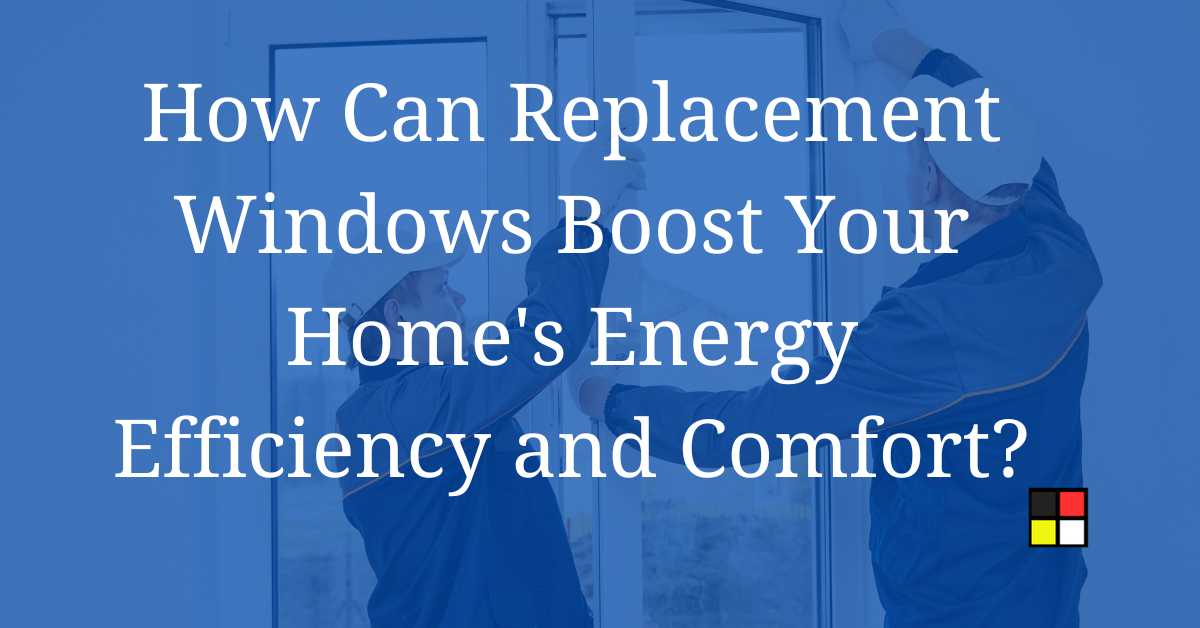Improving the energy efficiency of your home is a smart move that can lead to significant savings on heating and cooling costs. One of the effective ways to achieve this is through the installation of replacement windows.
Old, drafty windows are often a leading culprit in energy loss. Heat gain and heat loss through windows account for a substantial percentage of residential energy use.
By upgrading to energy-efficient windows, you can enhance the insulation of your home. This will reduce energy consumption and keep your living space more comfortable throughout the various seasons.
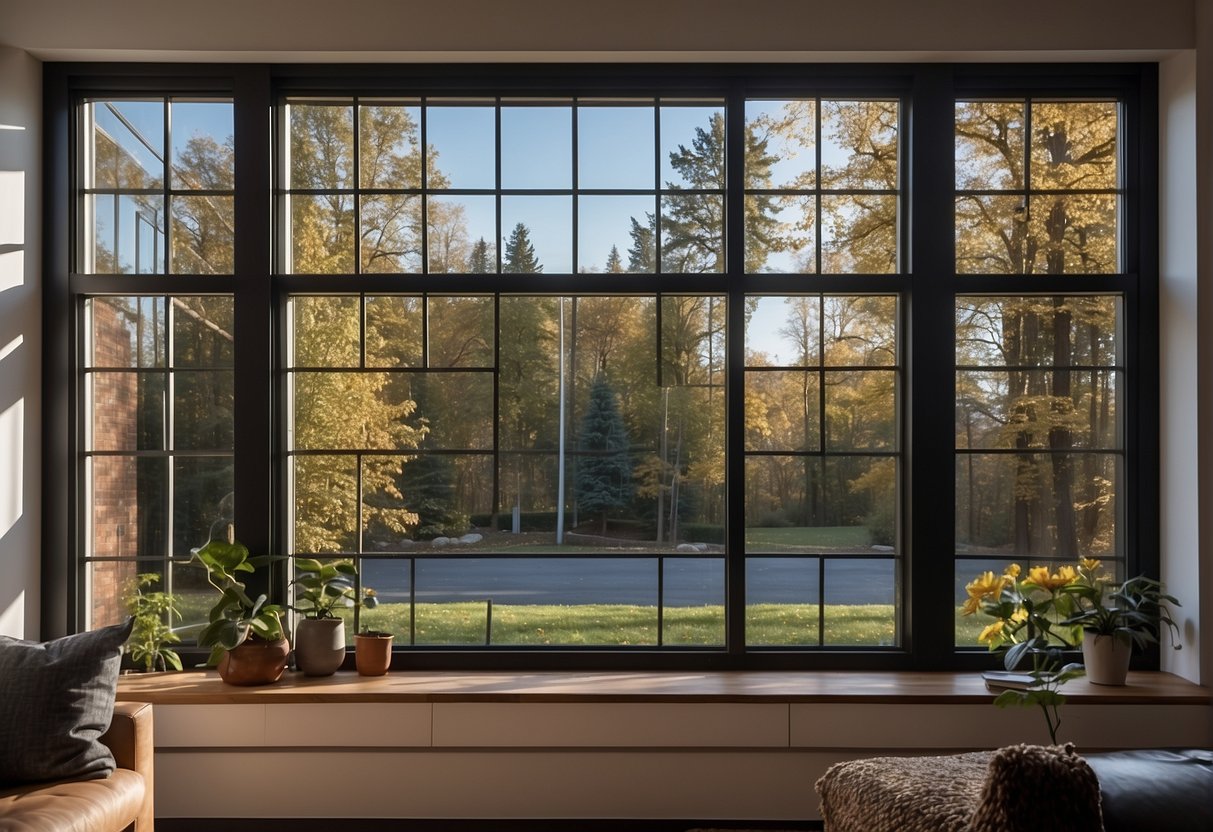
Energy-efficient windows come equipped with features designed to minimize heat transfer and optimize light entry, thereby maintaining the internal temperature of your home.
Special coatings, such as Low-E glass, reflect infrared and ultraviolet light to reduce solar heat gain while allowing ample natural light.
Additionally, the design and materials used in these windows, along with proper installation, play a major role in their performance.
With advancements in technology, homeowners now have an array of options to choose from, each tailored to different climate needs and aesthetic preferences.
Understanding the varied types and their benefits can guide you toward making an informed decision that aligns with your home’s specific requirements and contributes to a more energy-efficient household.
Key Takeaways
- Upgrading to energy-efficient windows can lead to significant energy savings.
- Features like Low-E coatings enhance window insulation to maintain comfortable indoor temperatures.
- Selecting the right windows and professional installation is crucial for optimal energy efficiency.
Benefits of Energy-Efficient Windows
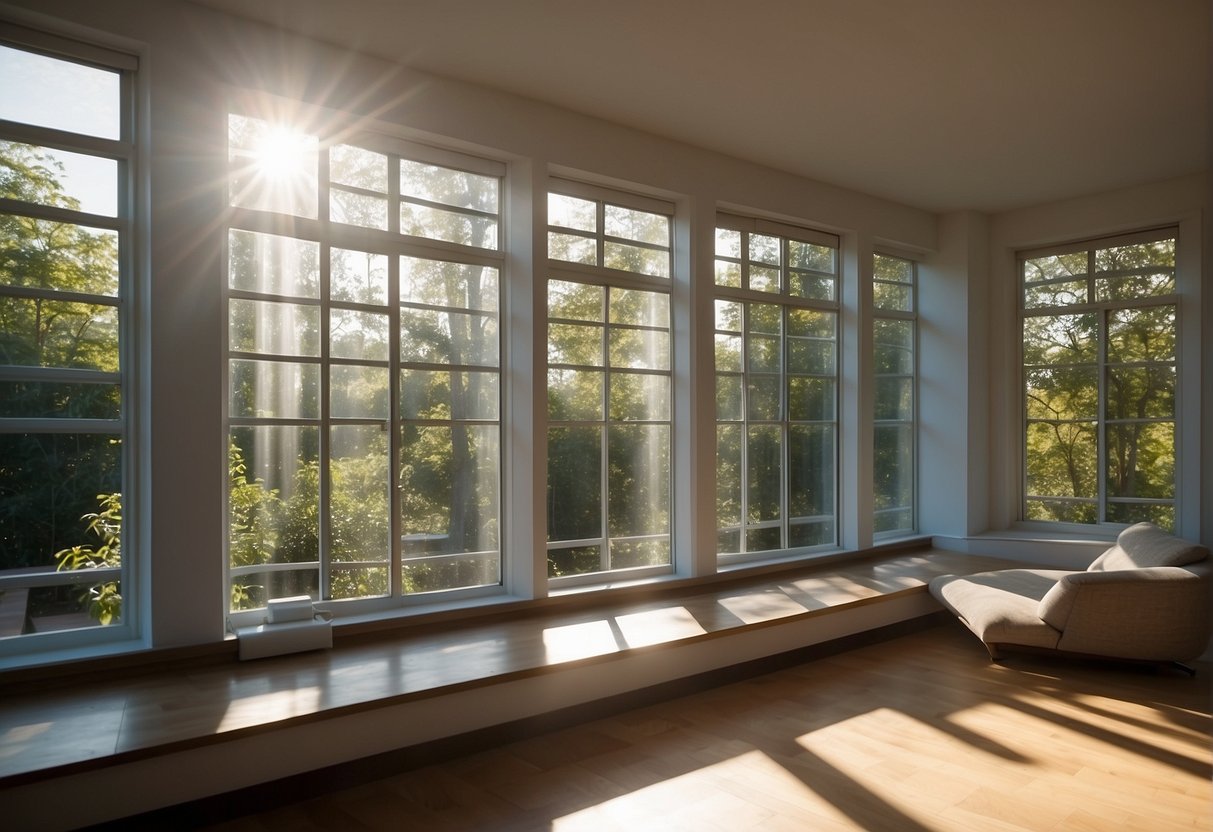
Installing energy-efficient windows in your home can lead to significant benefits, including reducing your energy bills, maintaining a more comfortable living environment, and contributing to the environment’s health by using less energy.
Reduced Energy Consumption
Energy-efficient windows help to minimize your home’s heating and cooling needs. They’re designed to keep heat in during winter and out during summer.
According to the Department of Energy, inefficient windows can account for a substantial percentage of heat gain and loss in your home, so upgrading can reduce the amount of energy your HVAC system uses to keep you comfortable.
Cost Savings over Time
Upfront, energy-efficient windows may come with a higher price tag, but they can lead to long-term savings on your energy bills.
By installing ENERGY STAR certified windows, you could save an average of 12% annually on energy bills. Specific savings depend on your existing windows and local energy costs, but they typically pay for themselves over time.
Enhanced Comfort Levels
Beyond savings, energy-efficient windows can significantly improve the comfort of your indoor environment.
They help to eliminate cold drafts in winter and reduce heat gain during summer months, leading to a stable and cozy indoor temperature.
Moreover, some windows come with coatings that can protect your interior surfaces by reducing the harmful UV light that can fade fabrics and furnishings.
Types of Energy-Efficient Windows
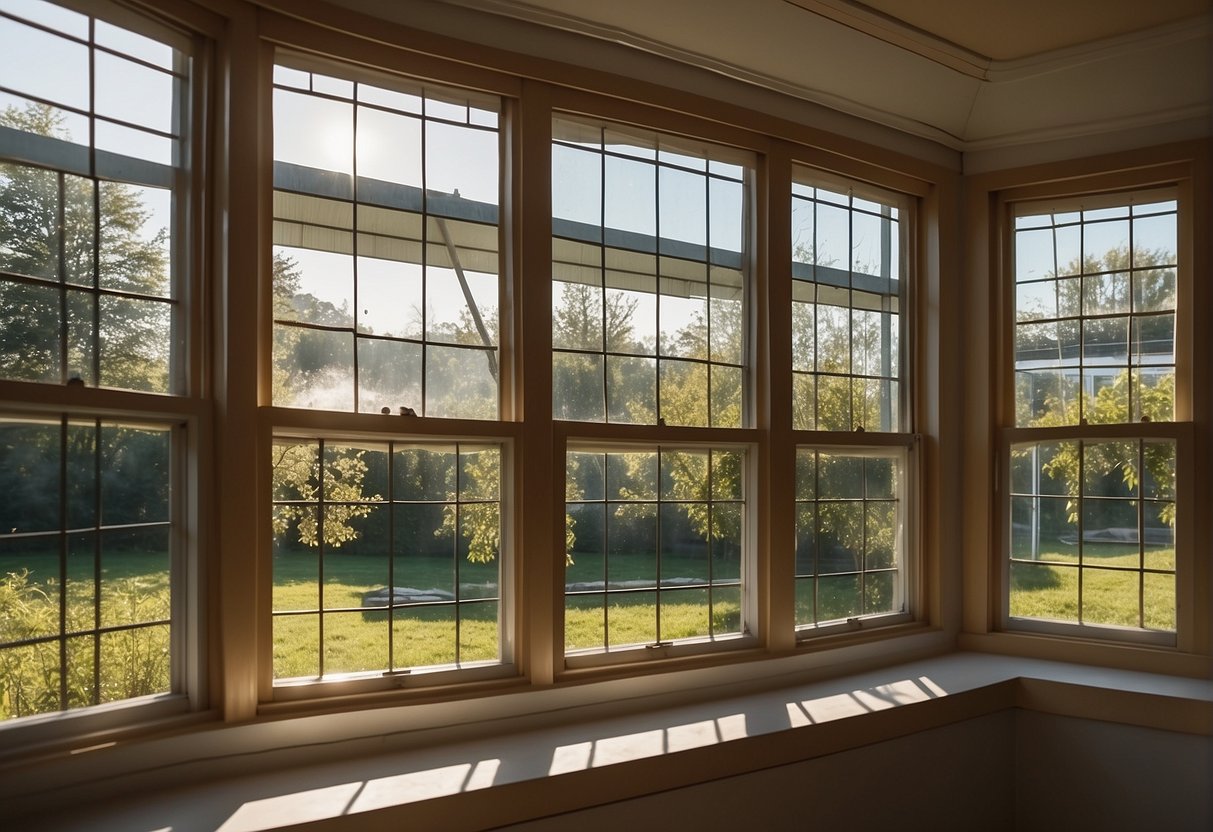
When you’re looking to cut down on energy costs, choosing the right windows is essential. Here’s a closer look at some specific window types that can boost your home’s energy efficiency.
Double-Pane Windows
Double-pane windows consist of two sheets of glass with a space between them.
This design creates an insulating barrier that reduces thermal transfer, helping to keep your home warmer in winter and cooler in summer. The space between the panes is often filled with inert gas, which provides additional insulation.
Low-Emissivity (Low-E) Coatings
Windows treated with Low-E coatings reflect infrared light, keeping heat inside in the winter and outside in the summer.
These coatings also protect against UV rays, which can fade furniture and carpets. Low-E coatings are an invisible layer that can be added to any window and can make a significant difference in your home’s energy efficiency.
Gas Fills and Spacers
The space between the panes in double- or triple-pane windows can be filled with inert gases like argon or krypton.
These gases are denser than air, offering better insulation. Spacers keep the panes the correct distance apart, reduce heat transfer, and help prevent condensation.
Installation and Maintenance

When considering energy efficiency, the way your replacement windows are installed and maintained plays a pivotal role. Proper installation ensures the best performance, while regular maintenance keeps that performance consistent over time.
Proper Installation for Maximum Efficiency
Selection of a Qualified Installer: Make sure you choose a certified installer who understands the importance of energy efficiency.
A professional installer will ensure that your windows fit perfectly, reducing the chances of air leaks.
Sealing and Insulation: Your installer should use high-quality sealing materials and techniques.
Insulating foam should be tactically placed to prevent airflow between the window frame and household framing, as this is a common area for energy loss.
Routine Checks and Upkeep
Annual Inspections: It is beneficial to visually inspect your windows each year.
Look for signs of seal failure, such as condensation or frost between panes, peeling paint, or decay in wood frames which might suggest moisture infiltration.
Cleaning and Lubrication: Keep your windows clean and the tracks lubricated.
Clean windowpanes allow for more sunlight and heat in the winter. Additionally, lubricated tracks ensure smooth operation, preventing undue strain on the window’s components.
Incentives and Certifications
When you upgrade your home with energy-efficient replacement windows, you could benefit from various incentives and certifications that acknowledge and reward your commitment to energy conservation.
Energy Star Certification
The Energy Star certification signifies that your replacement windows meet strict energy performance standards set by the U.S. Environmental Protection Agency.
By selecting windows with this certification, you’re choosing products that are designed to reduce energy bills and decrease your carbon footprint.
Potential Rebates and Incentives
You might be eligible for rebates and incentives that lower the initial investment in energy-efficient windows.
The Inflation Reduction Act of 2022 extended federal tax credits for energy efficiency, which could cover part of the cost for Energy Star certified upgrades, including windows.
It’s also advisable to check for additional state or local utility programs that might offer financial incentives.
Frequently Asked Questions
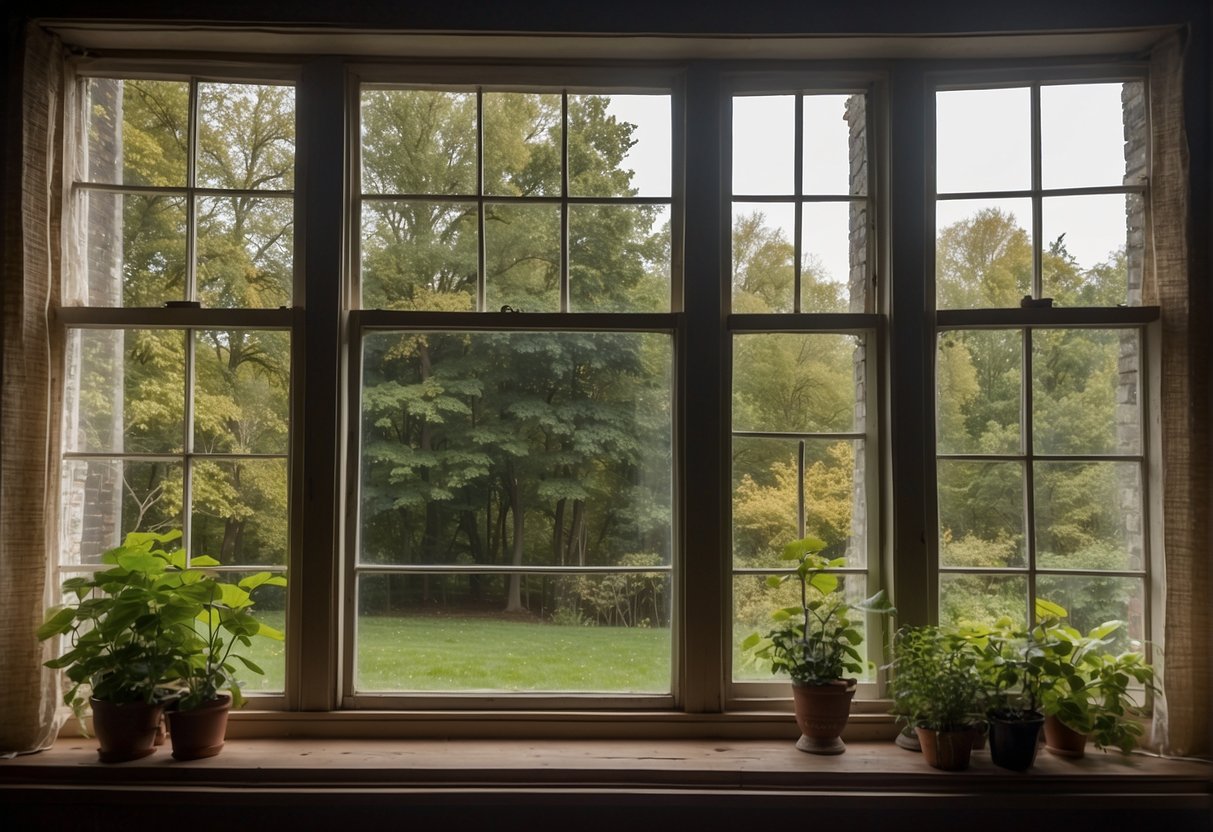
Replacing your home’s windows with energy-efficient models can lead to substantial energy savings. Learn how these upgrades can impact your home and your wallet.
What are the benefits of installing energy-efficient windows?
Energy-efficient windows help reduce your home’s energy consumption by maintaining a stable internal temperature, minimizing the workload on your heating and cooling systems.
You’ll experience increased comfort and lower utility bills due to improved insulation and reduced thermal transfer.
How can upgrading to energy-efficient windows impact heating and cooling costs?
Installing energy-efficient windows can decrease heating and cooling costs significantly.
They reduce the amount of heat gained or lost through your windows, which means your HVAC system won’t have to work as hard to keep your home comfortable.
What should I look for when choosing energy-efficient windows?
When selecting energy-efficient windows, look for options with low-E coatings, proper sealing, and double or triple-pane glass filled with inert gas for better insulation.
Features like these are designed to optimize thermal performance and UV protection.
Are there any government programs available for energy-efficient window replacement?
There may be incentives or rebates available for window replacement through government programs.
Explore the Department of Energy’s website for information on available tax credits and local incentives that encourage energy efficiency improvements.
How does window insulation contribute to overall home energy savings?
Well-insulated windows prevent heat exchange between your home’s interior and the outdoors, lowering the energy required to heat or cool your home.
This insulation effect enhances comfort and can reduce overall energy expenditure by a substantial margin.
Can installing energy-efficient windows increase my home’s resale value?
Yes, upgrading to energy-efficient windows can increase your property’s marketability and potentially its resale value. Energy-efficient improvements are often sought after for their savings on operating costs and contribution to a home’s overall sustainability profile.


